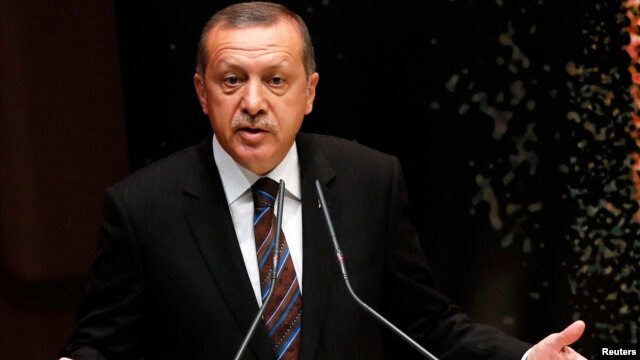Turkey's Erdogan May Be Changing His Attitude Toward Jihadists
Turkey's Prime Minister Tayyip Erdogan addresses members of his ruling AK Party during a meeting at the party headquarters in Ankara, Turkey, Aug. 14, 2014.
August 14, 2014 12:12 PM
ISTANBUL, TURKEY—
As prime minister of Turkey, Recep Tayyip Erdogan's foreign policy toward jihadist groups like the Islamic State has strained relations with his Western allies. And once again the issue is being raised as Erdogan ascends to his new role as president of Turkey, though it appears a change may be in the offing.
Erdogan bellowed to his supporters last month that Israel's military offensive in the Gaza Strip dwarfs the atrocities Hitler committed during World War II.
Erdogan bellowed to his supporters last month that Israel's military offensive in the Gaza Strip dwarfs the atrocities Hitler committed during World War II.
Despite condemnation from both Europe and Washington, Erdogan has continued to repeat these explosive remarks to rapturous applause from his conservative Muslim base.
Turkey's allies increasingly have been concerned about Erdogan's outbursts since last year's brutal crackdown on anti-government protests over plans to build on Gezi Park next to Istanbul's Taksim Square.
Signs of change
Sinan Ulgen, an analyst for the Carnegie Institute in Brussels, said that with Erdogan's ascension to the presidency, however, he may be ready to change course.
"He will try and improve his international image, an image that was tarnished over the past year, especially since Gezi," said Ulgen. "He will certainly have the opportunity to win back some of the trust that he lost in the last year in terms of his international standing."
The raging conflicts in Iraq and Syria, heightened by the sweeping gains of the radical group Islamic State, could offer President-elect Erdogan an opportunity to improve relations with his Western allies.
Turkey shares borders with both Iraq and Syria, so it's seen by Western intelligence agencies as key to keeping tabs on jihadists, especially when they return home.
Competing loyalties
But where Ankara's loyalties lie regarding radical Islamist groups like Islamic State is far from clear, according to international relations expert Soli Ozel of Istanbul's Kadir Has University.
"We have enough stories and evidence that Turkey played a role in the grooming of IS. They thought 'the more the merrier,' that is, the more groups attacking Bashar al-Assad regime [the better]," said Ozel. "We've heard from people in the regime and IS people themselves, how easily they can cross the border and now how it is finally becoming more difficult. Because in words, and I guess in deeds too, it's changing its policy. Because it can't sustain its dialogue with its Western allies, which after all Turkey understood it needs."
Analysts say cooperation between Turkey and Western intelligence agencies has improved in terms of monitoring Islamic State. They say the reason could be partly because Turkey is concerned about the repercussions of having backed jihadists.
Also adding to Erdogan's apparent change in policy is concern over the 49 diplomats that the Islamist group took hostage when it seized the Iraqi city of Mosul.
Ozel contends Ankara cannot fully move against Islamic State, though, for a few reasons.
"IS basically holds Turkey hostage by holding 49 hostages. We don't know the fate of the hostages. [And], if the reports are correct, 10 percent of IS fighters are Turkish," said Ozel. "That means there are lots of sympathizers. You never know where there are sleeper cells that may actually decide to commit a violent act in a major city."
Last month many Turkish TV channels broadcast footage of scores of Islamic State members and supporters holding a gathering just outside Istanbul. Such an event sends a powerful message to Erdogan that if he does move against the jihadist group, he will have to reckon with the threat of retaliation and the fate of the Turkish hostages. But the reward could be an important step in rebuilding relations with Turkey's Western allies.VOA



No comments:
Post a Comment